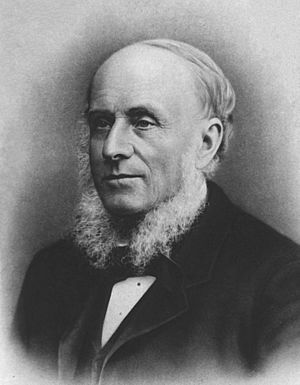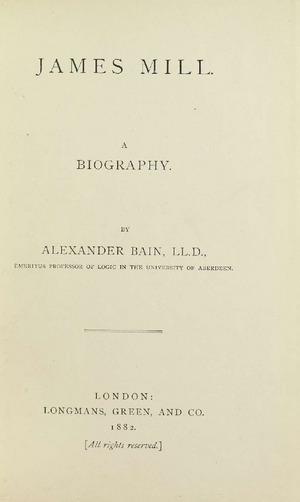Alexander Bain (philosopher) facts for kids
Quick facts for kids
Alexander Bain
|
|
|---|---|
 |
|
| Born | 11 June 1818 Aberdeen, Scotland
|
| Died | 18 September 1903 (aged 85) Aberdeen, Scotland
|
| Nationality | Scottish |
| Education | Marischal College (MA (Hons)) |
| Known for |
|
| Scientific career | |
| Fields | |
| Institutions |
|
| Influences | |
| Influenced |
|
Alexander Bain (born June 11, 1818 – died September 18, 1903) was a Scottish thinker who made big contributions to how we understand the mind, language, and education. He was a philosopher and an expert in teaching.
He started Mind, which was the very first magazine for psychology and philosophy. He was also a key person in using science to study how our minds work. Bain became a special professor at the University of Aberdeen in Logic, Moral Philosophy, and English Literature. He was also chosen twice to be the Lord Rector of the University of Aberdeen.
Contents
Alexander Bain's Early Life and Learning
Alexander Bain was born in Aberdeen, Scotland. His father, George Bain, was a weaver and a soldier. When Alexander was eleven, he left school to work as a weaver, just like his father. Even though he worked, he still loved to learn. He went to lectures at the Mechanics' Institutes in Aberdeen and spent time at the Aberdeen Public Library.
In 1836, he started studying at Marischal College. There, he was taught by amazing professors in math, chemistry, and physics. While he was still in college, he started writing articles for a magazine called the Westminster Review. His first article was about photography. This is how he met John Stuart Mill, who became his lifelong friend. Bain did very well in college, especially in subjects about the mind, math, and physics. He earned a high-level degree called a Master of Arts with Highest Honours.
In 1841, Bain helped out by teaching Moral Philosophy when the professor was sick. He did this for three terms. During this time, he kept writing for magazines and even helped John Stuart Mill with his important book, System of Logic.
Alexander Bain's Career as a Professor
In 1845, Bain became a professor of Math and Natural Philosophy at Anderson's University in Glasgow. But he wanted to do more, so he left that job a year later to focus on writing. In 1848, he moved to London and worked for the Board of Health. There, he worked on making society better and became part of a group of smart people, including George Grote and John Stuart Mill.
In 1855, he published his first major book, The Senses and the Intellect. Four years later, in 1859, he published The Emotions and the Will. These books made him famous among independent thinkers. Bain also worked as an examiner for the University of London and taught moral science for exams.
In 1860, the British Crown chose him to be the first professor of Logic and English Literature at the University of Aberdeen. This university was new, formed by combining two older colleges.
Bain's Work in Language
Before Bain arrived, subjects like logic and English were not taught very well in Aberdeen. Bain worked hard to fix this. He not only improved education in Scotland but also created a strong School of Philosophy at the University of Aberdeen. He also greatly influenced how English grammar and writing were taught in the United Kingdom.
He wrote many textbooks, including Higher English Grammar and An English Grammar (both published in 1863). He also wrote the Manual of Rhetoric in 1866 and other grammar books. These books were very popular because they offered new ideas and teaching methods.
Bain's Ideas in Philosophy
Bain's earlier philosophy books, like The Senses and the Intellect, were quite long. So, in 1868, he published a shorter version called Manual of Mental and Moral Science. This book explained his ideas in a simpler way and added new examples.
In 1870, he published The Logic. This book was for students and was based on the ideas of John Stuart Mill, but Bain added his own thoughts. It was special because it connected logic to different sciences. He also wrote Mind and Body (1872) and Education as a Science (1879). Bain wrote all these books during his twenty years as a professor at the University of Aberdeen.
He also started a philosophy magazine called Mind. The first issue came out in 1876. Bain paid for the magazine himself until 1891. He wrote many important articles for Mind.
Bain's Contributions to Psychology
Even though Bain was important in logic and language, he is best known for his work in psychology. He believed that to understand the mind, you also needed to understand the body. He was the first person in Great Britain in the 1800s to really use the study of the body (physiology) to explain how our minds work.
When he talked about how we make choices (the will), he looked at how our bodies react, like reflexes, instead of just thinking about deep philosophical ideas. He tried to find out how our physical states are connected to our mental states. Bain wanted psychology to be a clear science, free from complicated philosophical ideas. Because of him, psychology became a separate and important scientific field.
Bain suggested that our physical and mental processes are linked. He believed that all our knowledge and thoughts come from real physical feelings, not just random ideas. He tried to find the connections between the mind and the body, and between how we think and how we behave.
Some people say his work was the "last word" of old psychology, but he was actually a pioneer of the new way of thinking. Later studies in psychology followed his ideas. He believed in looking inside our own minds to understand them, but he also saw how helpful it was to study how people act in groups, how animals think, and how children develop. He helped guide British thinkers in the late 1800s to explore psychology in new and useful ways. Bain also thought that our experiences of moving and trying hard were very important.
Other Writings by Bain
Bain's autobiography, published in 1904, lists all his works. It also includes a history of the last thirteen years of his life. He helped edit other important books, like James Mill's Analysis of the Phenomena of the Human Mind.
Alexander Bain's Work for Social Change
Bain cared a lot about social justice and making society better. He was often involved in the political and social movements of his time. After he retired from being a professor, he was chosen twice to be the Lord Rector of the University of Aberdeen.
He strongly supported reforms, especially in how sciences were taught. He also believed that modern languages should be an important part of school lessons. He was a big supporter of student rights. In 1884, with his help, students at Aberdeen University started working towards having a student council to represent them.
Bain was a member of the committee for the Aberdeen Public Library his whole life. He also served on the School Board of Aberdeen. He gave lectures and wrote papers for the Mechanics' Institutes in Aberdeen and was the secretary of its committee.
His work for education and social change in Scotland was recognized when the University of Edinburgh gave him an honorary degree in 1871. There is a marble statue of him in the Aberdeen Public Library, and his portrait hangs in Marischal College.
Alexander Bain's Later Life and Passing
Bain retired from his professorship at the University of Aberdeen. Even after retiring, he remained very interested in thinking and wanted to finish the work he had planned years before. In 1882, he published a biography of James Mill and a book about John Stuart Mill.
He also published a collection of articles called Practical Essays in 1884. Later, he released new editions of his Rhetoric and a book called On Teaching English, which helped teachers understand how to improve writing style. In 1894, he published a revised edition of The Senses and the Intellect, which contained his final thoughts on psychology. He also wrote his last article for Mind in 1894.
Bain spent his last years quietly in Aberdeen and passed away on September 18, 1903. He was married twice but did not have any children. His last wish was that no stone should be placed on his grave, saying his books would be his monument.
The University of Aberdeen Philosophy Department created the Bain Medal in 1883. It is given every year to the best student who achieves top honors in Mental Philosophy.
Professor William L. Davidson wrote in Bain's obituary that psychology lost a great mind when Dr. Bain died. But so did education and practical reforms. It is rare to find a philosopher who is also interested in education and making real changes in the community. Bain was such a person, and we should remember his contributions.
See also
 In Spanish: Alexander Bain para niños
In Spanish: Alexander Bain para niños
- Association of ideas
- Grupo Alexander Bain
- Psychophysical parallelism
- Mind
- Stream of consciousness (narrative mode)
 | Emma Amos |
 | Edward Mitchell Bannister |
 | Larry D. Alexander |
 | Ernie Barnes |


